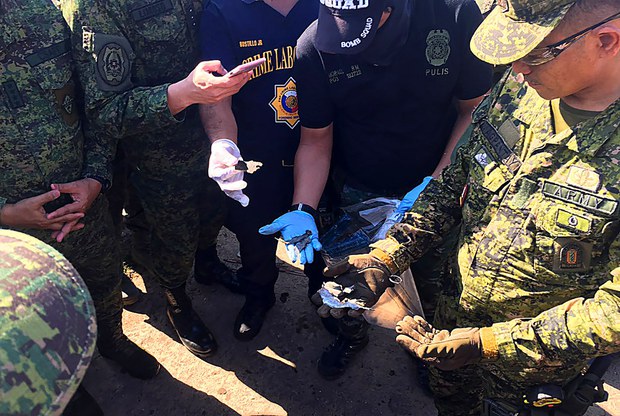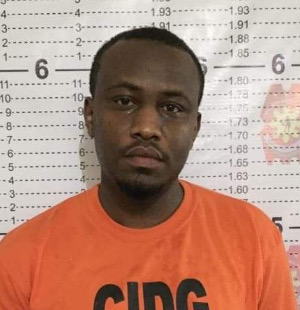Filipino’s Family Identifies Body Tagged by Military as Suicide Bomber
2019.07.02
Cotabato and Dagupan, Philippines
 Philippine police and military investigators examine evidence collected at the headquarters of the 1st Battalion Combat Team in Indanan town after two suicide bombers detonated their explosives, June 29, 2019.
Philippine police and military investigators examine evidence collected at the headquarters of the 1st Battalion Combat Team in Indanan town after two suicide bombers detonated their explosives, June 29, 2019.
Updated at 3 p.m. ET on 2019-07-02
The Philippine military on Tuesday named an alleged Filipino militant as one of two suicide bombers who detonated explosives while trying to enter a military camp on southern Jolo island last week, killing themselves and six people.
Maj. Gen. Cirilito Sobejana identified the bomber as Norman Lasuca, 23, whose father was a Muslim convert and whose mother is a member of the island’s Tausug ethnic group.
“He is Filipino. This is hard for his family because they last saw him in 2014, according to the father,” Sobejana told BenarNews.
Confirmation that the attack involved a Filipino would mark a major escalation in terror tactics in the Southeast Asian nation, where authorities had long said suicide bombings went against local culture, analysts said.
Sobejana, the Western Mindanao Command chief, said family members had identified Lasuca by his head, which was severed in the blast. He said DNA tests would be conducted to confirm Lasuca’s identity.
Military officials said one of the two bombers managed to sprint past the gate of the 1st Battalion Combat Team in Jolo’s Indanan town and shouted “Allahu Akbar,” the Arabic phrase for “God is Great,” before setting off his vest packed with explosives. The other militant, who has not been identified, set off his bomb at the gate, killing three soldiers and three civilians.
The blasts injured 22 people, including 12 soldiers, authorities said.
Military intelligence reports indicate that Lasuca joined an Abu Sayyaf faction controlled by Hatib Hajan Sawadjaan, a religious elder identified by the U.S. Defense Department as the new head of Islamic State in the Philippines.
Security officials said Sawadjaan replaced Isnilon Hapilon, who was killed two years ago near the end of a five-month battle after he and other militants laid siege to the southern Philippine city of Marawi in May 2017.
Sawadjaan’s group was blamed for explosions that killed 23 people at the Our Lady of Mount Carmel Catholic cathedral in Jolo in January. The church blasts took place five months after a German of Moroccan descent drove a van filled with explosives through a checkpoint in southern Basilan island, leaving 11 dead.
In both cases, Abu Sayyaf factions with ties to the IS were blamed. Philippine officials said Indonesian suicide bombers were behind the blasts at the cathedral, but Jakarta investigators denied the allegation after conducting their own probe in the southern Philippines.
Sobejana said military officials hadnot determined what drove Lasuca to join the Abu Sayyaf, a group of militants who consider themselves as extremists, but are more known for random attacks including beheadings, kidnapping raids and bombings.
The Friday attack occurred as Sobejana was being installed as the new military chief of the southern region that includes Jolo. He vowed to crush the Abu Sayyaf, which the military claims has between 400 and 600 fighters, many of whom are sons of former militants.
The military has deployed about 10,000 fighters since last year in a bid to crush the militants who have so far enmeshed themselves in Jolo’s thick jungle, where they can camouflage themselves and plot attacks.

Al-Shabaab connection
Meanwhile, security forces in the northern Philippines reported capturing a Kenyan national on Monday who has known links to Al-Shabaab, a group affiliated with the al-Qaeda terror network.
Maj. Gen. Amador Corpus, chief of the police criminal investigation and detection unit, identified the suspect as Cholo Abdi Abdullah, who allegedly was plotting a terror attack in the northern province of Zambales. Police seized an improvised bomb, a pistol and a hand grenade at his hotel room, Corpus said.
He said Abdullah was enrolled in an aviation school and was doing research “on different aviation threats, aircraft hijacking and falsifying travel documents.”
Early this month, police and immigration authorities captured Pakistani Waqar Ahmad, 36, who was accused of planning to be a suicide bomber with links to the IS. He was arrested in southern Zamboanga City and was allegedly part of a plot to carry out attacks in nearby Basilan island.
Mark Navales in Cotabato contributed to this report.







